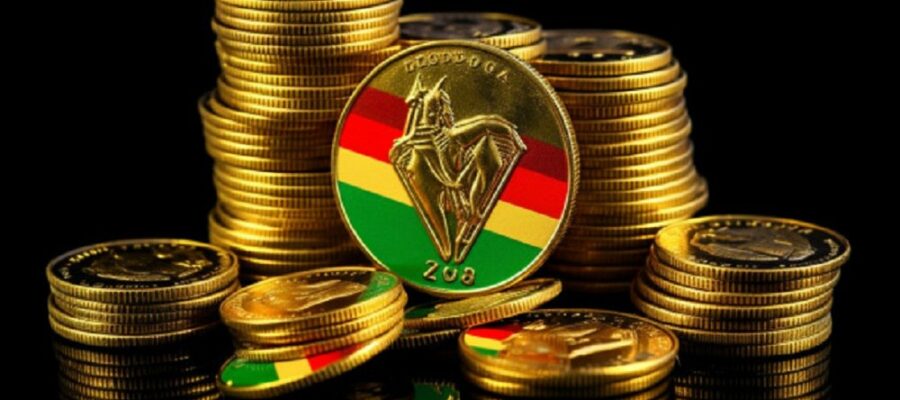An official report from the Reserve Bank of Zimbabwe (RBZ) revealed that the sales for the gold-backed digital tokens yielded a revenue of $39 million in the past few days. The RBZ confirmed it received around 135 purchase applications for the new digital token on May 12. The number of purchase for the gold-backed token amounted to 14.07 billion Zimbabwean dollars.
According to the report, the gold-backed digital token was launched in April to support peer-to-peer (P2P) transactions in the region. While launching the digital token, the RBZ official aimed to support the local currency value from further decline.
Review Gold-Backed Token Sales
Additionally, the launch of the gold-backed digital token aimed at allowing investors and businesses in Zimbabwe to use electronic payment methods. It was reported that the RBZ officials backed the digital token with 139.57 kilograms of gold to boost its efficiency as a payment method.
After the launch of the gold-backed digital token, the RBZ made the token available in the market from May 8 and 12. Per the RBZ report, the minimum market value for the new token was $10 for consumers. In contrast, the corporates and institutional investors acquired the gold-backed token at $5000.
The team behind the new token ensured the token holder would garner endless benefits from the digital currency by intergrating cutting edge features. Reportedly, the token holder of the gold-backed token is offered a minimum vesting period of 180 days. The trader can store the digital assets in the e-gold wallet during this period.
The RBZ team integrated exceptional features on the gold-backed token to support Zimbabwe’s economic growth. In a previous report, the RBZ group announced that the launch of a token aimed at minimizing the demand for the US dollar that had exposed the Zimbabwean currency to loss of value.
According to XE.com, the 362 Zimbabwean dollars are trading at $1. In the streets of Harare, the Zimbabwean dollar is trading at a higher value due to a stash nominally amounting to $38.9 million.
Will the Gold-Back Token Address Inflation in Zimbabwe?
In an interview with the local Zimbabwean news site, the Governor of RBZ, Dr John Mangudya, revealed that the second round for selling the gold-backed token was open. He urged the traders to apply, and all payments will be made by May 18.
Dr Mangudya added that the new token aims at supporting the country’s financial tools that support the currency value to boost the economy. He announced that the digital token has enormous potential to support the divisibility of investment tools and promote the adoption of the new digital asset.
A few days ago, the International Monetary Fund (IMF) criticized the Zimbabwean gold-backed token. The IMF officials argued that the Zimbabwean authority should prioritize liberalizing the foreign exchange market.
The IMF team mandated the RBZ and Zimbabwean watchdog agencies to conduct extensive research on the impact of gold-backed tokens on the country’s economy. The IMF advised the Zimbabwean regulators to examine the benefits, risks and threats associated with the new token.
IMF Warns Zimbabwe Authority Over the Adoption of New Token
The IMF spokesperson urged the RBZ to assess how macroeconomic, financial stability, operational cost, and potential governance risk affected the country’s economy. Based on the IMF announcement, the RBZ is encouraged to adopt conventional measures to address the country’s economic crisis.
A review of the Zimbabwean economic performance revealed that the country suffered hyperinflation and price fluctuation for years. The attempt to address the inflation concerns compelled the South African country to adopt the US currency in 2009.
Since then, the Zimbabwean currency has plummeted by 40% against the US dollar value to trade at 1070 on regulated markets in 2023. The test to support the value of the local currency obliged the RBZ to reintroduce the Zimbabwean dollar in 2019.
Despite the regulator’s effort to support the local currency, the spiking inflation rates and macroeconomic pressure undermine their effort. Reflecting on the IMF report, the Zimbabwean regulators are urged to adopt stricter monetary policies to support the country’s economy and local currency. Also, the IMF requested the RBZ to reconsider eliminating the exchange rate restrictions imposed by the banks.
All trademarks, logos, and images displayed on this site belong to their respective owners and have been utilized under the Fair Use Act. The materials on this site should not be interpreted as financial advice. When we incorporate content from other sites, we ensure each author receives proper attribution by providing a link to the original content. This site might maintain financial affiliations with a selection of the brands and firms mentioned herein. As a result, we may receive compensation if our readers opt to click on these links within our content and subsequently register for the products or services on offer. However, we neither represent nor endorse these services, brands, or companies. Therefore, any disputes that may arise with the mentioned brands or companies need to be directly addressed with the respective parties involved. We urge our readers to exercise their own judgement when clicking on links within our content and ultimately signing up for any products or services. The responsibility lies solely with them. Please read our full disclaimer and terms of use policy here.

